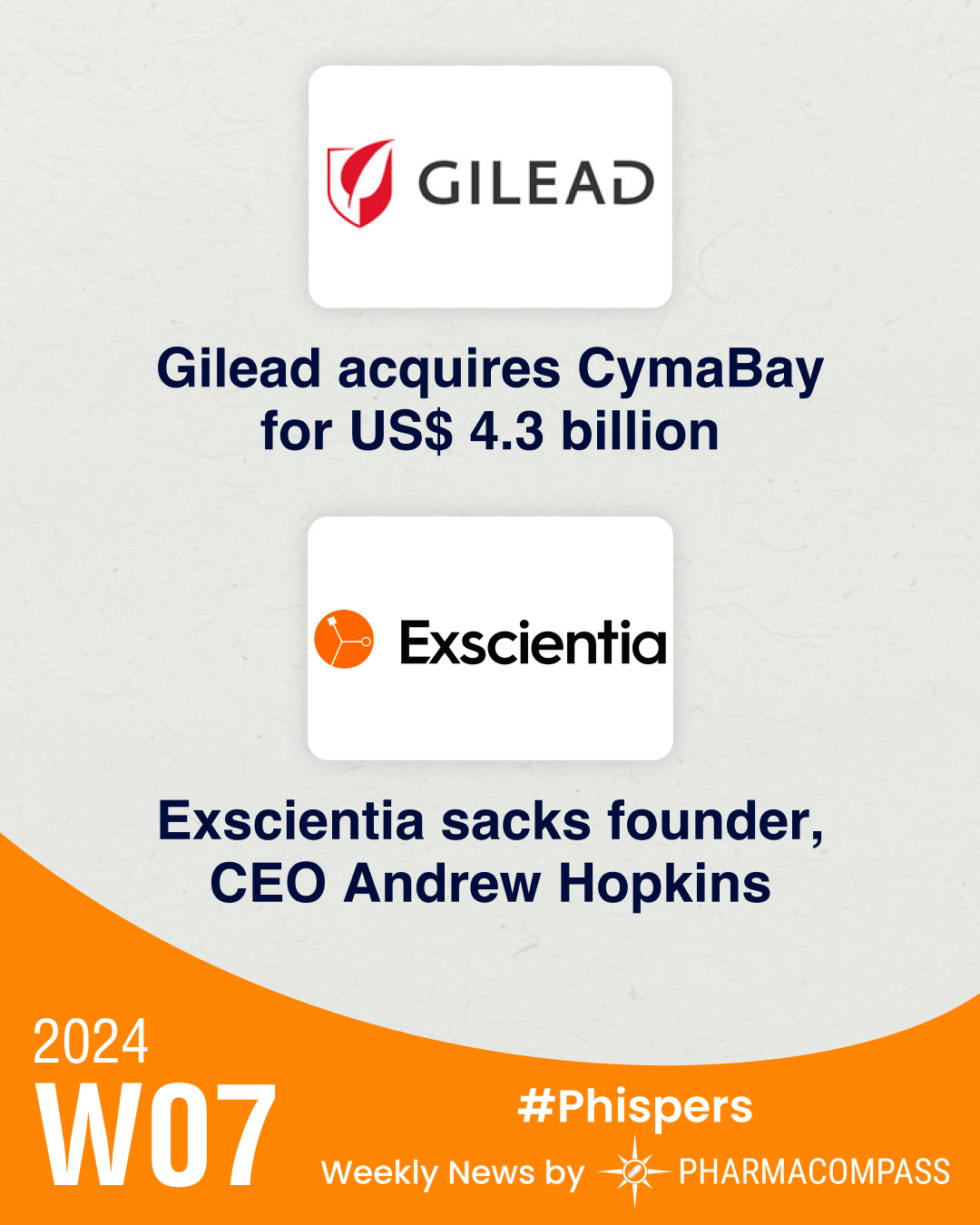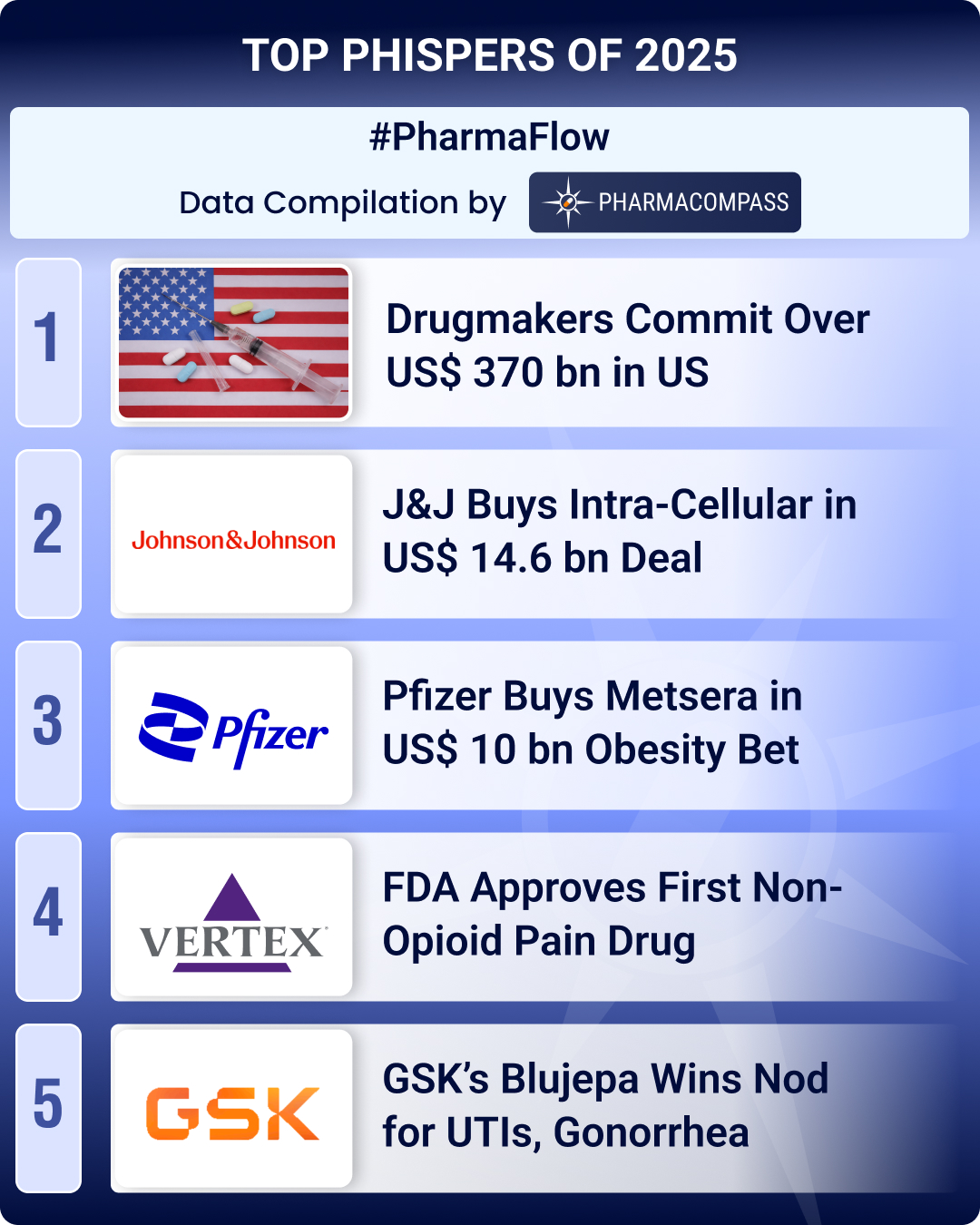
By PharmaCompass
2024-02-15
Impressions: 1,766 Article || 2 Video
In this week’s Phispers, Gilead boosted its liver portfolio with the US$ 4.3 billion acquisition of CymaBay Therapeutics. The buyout included a potential blockbuster — seladelpar — being investigated to treat primary biliary cholangitis (PBC), a debilitating liver condition.
British biotech Exscientia’s founder and CEO Andrew Hopkins, who was recently named a top AI innovator by Time magazine, has been sacked over his “inappropriate” relationships with two employees.
After being threatened with subpoenas, the CEOs of Merck and Johnson & Johnson joined their Bristol Myers Squibb counterpart at a Senate hearing committee on why drug prices in the United States are substantially higher than in other countries. The Big Pharma heads managed to walk away without making any promises to lower drug prices.
A federal judge has dismissed the Pharmaceutical Research and Manufacturers of America (PhRMA) lawsuit that had termed drug price negotiations via the Inflation Reduction Act (IRA) “unconstitutional”.
Data published ahead of a global conference on novel RSV therapies has shown that the efficacy of Moderna’s mRNA-1345 vaccine dwindled faster than its rival shots by GSK and Pfizer.
The US Food and Drug Administration (FDA) has approved Takeda’s Eohilia as the first oral treatment for an allergic inflammation of the esophagus. The Japanese drugmaker had all but given up on the candidate, which it got through its US$ 62 billion acquisition of Shire.
Gilead boosts its liver portfolio with US$ 4.3 billion acquisition of CymaBay
Gilead Sciences has entered into an agreement to acquire CymaBay Therapeutics for US$ 4.3 billion. California-based CymaBay has developed a potential blockbuster liver drug — seladelpar — that analysts estimate could generate revenue of US$ 1.9 billion by 2029. Seladelpar has a Prescription Drug User Fee Act (PDUFA) target date of August 14. Gilead said the treatment complements its existing liver portfolio. Seladelpar is used to treat primary biliary cholangitis (PBC), which causes debilitating fatigue, progression of which can lead to liver-related death.
BMS, Merck, J&J’s CEOs grilled by US Senate over high drug prices
The Senate Committee on Health, Education, Labor, and Pensions (HELP) grilled the CEOs of Bristol Myers Squibb, Merck, and Johnson & Johnson as to why drug prices in the US are considerably higher than in other countries. However, the committee failed to elicit any promises to lower drug prices. The top executives stuck to their guns with Merck’s CEO saying Keytruda (pembrolizumab) is approved in the US for 39 indications compared to just over 20 in Europe and perhaps lesser in Japan. He said that’s because those markets are “unwilling to support innovation.” Generally, the three CEOs argued the extra costs meant that Americans can access cutting-edge medicines months, sometimes years, ahead of the rest of the world.
Lawsuit against IRA price negotiations dismissed: A federal judge in Texas has tossed a lawsuit filed by PhRMA and two other organizations that argued the IRA price negotiations violated Eighth Amendment rights (excessive fines) under the US Constitution. The judge found that the plaintiffs lacked standing. This is seen as a victory for the Biden administration given that this was the first time a court has dismissed a price negotiation challenge outright. Eight other such lawsuits have been filed.
Exscientia sacks CEO over ‘inappropriate’ relationships with two employees
AI-focused biotech Exscientia has fired its founder and CEO Andrew Hopkins a little over a month after they celebrated him being appointed Commander of the Order of the British Empire. The Oxford drug company said it sacked Hopkins after an investigation found Hopkins had engaged in relationships with two employees that were “inappropriate and inconsistent” with its standards and values. Chief Science Officer Dave Hallett was appointed interim CEO. Hopkins was named one of the top AI innovators in a Time 100 list. His wife is also employed with Exscientia.
Efficacy of Moderna’s RSV vaccine dwindled faster than those of GSK, Pfizer, implies data
Data published ahead of a global conference on novel RSV therapies showed the efficacy of Moderna’s mRNA-1345 vaccine dwindled faster than its rival shots by GSK and Pfizer. Moderna’s shot, which had an efficacy of 84 percent at 3.3 months, fell to 63 percent by 8.6 months. Meanwhile, GSK’s Arexvy, which had an efficacy of 83 percent in the prevention of RSV, fell to 77 percent at 14 months. Pfizer’s vaccine had an efficacy of 89 percent, which fell to 79 percent in the middle of the second RSV season, experts said.
Moderna cautioned against reading too much into the data. “In the absence of head-to-head clinical trials, comparative conclusions regarding the safety and efficacy of mRNA-1345 relative to other RSV vaccines cannot be made,” it said.
Takeda’s once-snubbed Eohilia becomes first FDA-approved oral therapy for esophageal condition
In the US, FDA has approved Takeda’s Eohilia as the first oral treatment for an allergic inflammation of the esophagus. Eohilia (budesonide oral suspension) was on course to becoming the first treatment for eosinophilic esophagitis (EoE) until it was rejected by the FDA in December 2021. Takeda had all but abandoned the drug since. In January, Sanofi and Regeneron’s jab Dupixent pipped Eohilia to become the first FDA drug approved for EoE.
The chronic condition is caused by a build up of certain white blood cells in the esophagus lining resulting in inflammation and tissue injury. This can make it very hard for patients to consume food. Dupixent (dupilumab) is injected weekly or biweekly and two pens cost US$ 3,803.20. In contrast, Takeda’s drug is taken twice daily and costs US$ 1,875 per month.
Ipsen’s Onivyde okayed as first-line pancreatic cancer treatment: FDA has approved Ipsen’s Onivyde (irinotecan liposome injection) as part of a four-drug regimen, first line of treatment for metastatic pancreatic adenocarcinoma (mPDAC). A late-stage trial showed the regimen Nalirifox was significantly superior to the current standard of care. The Pancreatic Cancer Action Network (PanCAN) welcomed the decision “as it has been more than 10 years since there has been a PDAC-specific approval in the first-line setting.” Pancreatic cancer is hard to treat and has the lowest five-year survival rate of all cancers.
First med for severe frostbite approved: FDA has approved Eicos Sciences’ Aurlumyn (iloprost) as the first ever medication to treat severe frostbite. The injection will help prevent amputation of fingers and toes, the agency said.
The PharmaCompass Newsletter – Sign Up, Stay Ahead
Feedback, help us to improve. Click here
Image Credit : Phisper Infographic by PharmaCompass license under CC BY 2.0
“ The article is based on the information available in public and which the author believes to be true. The author is not disseminating any information, which the author believes or knows, is confidential or in conflict with the privacy of any person. The views expressed or information supplied through this article is mere opinion and observation of the author. The author does not intend to defame, insult or, cause loss or damage to anyone, in any manner, through this article.”







